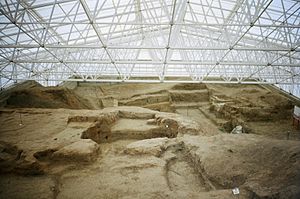7th millennium BC
Appearance
During the 7th millennium BC, agriculture spreads from Anatolia to the Balkans.
World population is essentially stable at around 5 million people, living mostly widely scattered across the globe in small hunting-gathering tribes. In the agricultural communities of the Middle East, the cow is domesticated and use of pottery grows common, spreading to Europe and South Asia, and the first metal (gold and copper) ornaments are made.
Cultures

- c. 7000 BC — First neolithic settlements with ceramics, in Crete, Aegean Sea — Greece.
- c. 7000 BC — Beginning of the Peiligang culture in China.
- c. 7000 BC — Agriculture and neolithic settlement at Mehrgarh, in current-day Baluchistan, Pakistan.
- c. 7000 BC–600 BC — Elam.
- c. 7000 BC — Elam becomes farming region.
- c. 7000 BC–6000 BC — Figure from Ain Ghazal, Jordan, was made. It is now in National Museum, Amman, Jordan.
- c. 7000 BC — Paleolithic period ended. Neolithic period started.
- c. 6850–4800 BC — Advanced agriculture and a very early use of pottery by the Sesclo culture in Thessaly, Greece.
- c. 6500 BC — Beginning of the Houli culture in China.
- c. 6500 BC–5500 BC — Çatalhöyük, Turkey. Inhabitants traded obsidian. c. 5000 inhabitants.
- c. 6200 BC — Beginning of the Xinglongwa culture in China.
- c. 6000 BC — Beginning of the Cishan culture in China.
- c. 6000 BC — First traces of habitation of the Svarthola cave in Norway.
Environmental changes
- c. 7000 BC — Wild horse populations drop in Europe proper; horse disappears from the island of Great Britain, but was never found in Ireland. (Horse & Man, Clutton-Brock) Extinction probably caused by climatic shift, leading to excessively rich spring feed and mass lameness from founder, making them easy prey (Bolich & Ingraham)
- c. 7000 BC — English Channel formed[1]
- c. 7000 BC — Neolithic Subpluvial begins in northern Africa
- 6440 BC ± 25 years — Kurile volcano on Russia's Kamchatka Peninsula has VEI 7 eruption. It is one of the largest of the Holocene epoch
- c. 6100 BC — The Storegga Slide, causing a megatsunami in the Norwegian Sea
- c. 6000 BC — Rising sea levels form the Torres Strait, separating Australia from New Guinea
- c. 6000 BC — Between 12,000 BC and 5,000 BC it appears that massive inland flooding was taking place in several regions of the world, making for subsequent sea level rises which could be relatively abrupt for many worldwide.
Inventions, discoveries, introductions
- c. 7000 BC — Mesolithic site Lepenski Vir emerges in today's Serbia.
- c. 7000 BC — Earliest pottery in Ancient Near East.
- c. 7000 BC — Elam became farming region.
- c. 7000 BC — Chinese domestication of rice, millet, soy beans, and yams. (1990 Rand McNally Atlas)
- c. 7000 BC — Red pepper, bottle gourd, avocados, and squash cultivated on Pacific coast of Guatemala. (Bailey 1973)
- c. 6500 BC — Naalebinding, a form of knitting, used in Judean Desert (modern day Israel).
- c. 6500 BC - Two breeds of non-wolf dogs in Scandinaviia. Domestic pigs appear at Jarmo. Domestic cattle in Turkey.
- c. 6000 BC — Wall painting/map from Çatalhöyük, an early-civilized city that prospered by trading obsidian, Anatolia — modern Turkey.
- 6000 BC — Ban Po settlement in China.
- 8000 BC — Jericho settlement in the Levant.
- Agriculture appears around in the Balkans, see Old European Culture.
- Beekeeping is first recorded. Rock paintings on cave walls in Africa and eastern Spain show people gathering honey from trees or rock crevices while bees fly around them — cave drawings in Spain, near Valencia.
- Pastoralism and cultivation of cereals (East Sahara).( [citation needed])
- Gold and native copper begin to be used.( [citation needed])(where?)
- Middle East: Domestication of the cow.( [citation needed])
- Archaic pottery making, burial mound construction, and garden technology (North America).
- North America: Indigenous Peoples of the Americas begin using stone to grind food and to hunt American Bison and smaller animals.
- North America: Deciduous plants make their appearance on Long Island .
- North America: Northern Atlantic Ocean is cooled by 36–°C due to enormous floods. ( [citation needed])
- Mexico — Incipient agriculture begins (North America).
- Peru, Guitarrero Cave, plant fibers are twisted, knotted, and looped into baskets, mats (South America).
- Eastern Mediterranean — Forms of pottery become decoration.
- Animal figures of Estuarine-period rock painting in Australia include saltwater fish and crocodiles Australia.
References
- ^ Roberts, J: "History of the World." Penguin, 1994.
